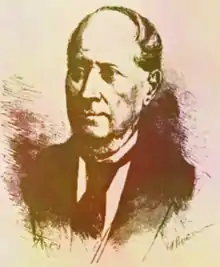Luigi Palmieri | |
|---|---|
 Luigi Palmieri | |
| Born | 22 April 1807 |
| Died | 9 September 1896 (aged 89) Naples, Italy |
| Nationality | Italian |
| Scientific career | |
| Fields | |
Luigi Palmieri (22 April 1807 – 9 September 1896) was an Italian physicist and meteorologist. He was famous for his scientific studies of the eruptions of Mount Vesuvius, for his researches on earthquakes and meteorological phenomena and for improving the seismograph of the time.[1]
Biography
Palmieri was born in Faicchio, Benevento, Italy and died in Naples, Italy at the age of 89.
Palmieri received a degree in physics from the University of Naples. In 1845, he was made Professor of Physics at the Royal Naval School in Naples and in 1847 was appointed as Chair of Physics at the university. In 1848, he began working at the Vesuvius Observatory and in 1854 was appointed as Director of the Observatory. Using an electromagnetic seismometer for the detection and measurement of ground tremors, Palmieri was able to detect very slight movements in trying to predict volcanic eruptions. Furthermore, he was the first to detect the presence of Helium on Earth on the lava of Mount Vesuvius.[2][3]
Using a modified Peltier electrometer, he also carried out research in the field of atmospheric electricity. Other scientific contributions included the development of a modified Morse telegraph, and improvements to the anemometer and pluviometer.
Biography
- Royal Society of Naples (Academy of Sciences) – 1861
- Academy of the Lincei (Florence) – 1871
- American Philosophical Society (Philadelphia) -- 1873[4]
See also
Honours
- The crater Palmieri on the Moon
- Member of the Superior Council of Meteorology
- Senator of the London tower
- Grand Commander of the Order of the Crown of Italy
- Commander of the Order of Rosa del Brazile
Publications

- "Annali dell' osservatorio Vesuviano". 1859–1873.
- "Incendio Vesuviano del 26 Aprile 1872". Naples, 1872. (Ger.: Berlin, 1872)
- "Il Vesuvio e la sua storia". Milan, 1880.
- "Nuove lezioni di fisica sperimentale e di fisica terrestre". Naples, 1883.
- "Die Atmospharische Elektrizität". Vienna, 1884.
- "Les lois et les origines de l'électricité". Paris, 1885.
- Leggi ed origine dell'elettricità atmosferica (in French). Paris: Gauthier-Villars. 1885.
References
- ↑ "Seismographen". Archived from the original on 2011-03-18. Retrieved 2011-02-18.
- ↑ Palmieri, Luigi (1881). "La riga dell'Helium apparsa in una recente sublimazione vesuviana" [The line of helium appeared in a recently sublimated material [from Mt.] Vesuvius.]. Rendiconto dell'Accademia delle Scienze Fisiche e Matematiche (Naples, Italy). 20: 223. Archived from the original on 1 September 2018. Retrieved 1 May 2017.
Raccolsi alcun tempo fa una sostanza amorfa di consistenza butirracea e di colore giallo sbiadato sublimata sull'orlo di una fumarola prossima alla bocca di eruzione. Saggiata questa sublimazione allo spettroscopio, ho ravvisato le righe del sodio e del potassio ed una lineare ben distinta che corrisponde esattamente alla D3 che è quella dell'Helium. Do per ora il semplice annunzio del fatto, proponendomi di ritornare sopra questo argomento, dopo di aver sottoposta la sublimazione ad una analisi chimica. (I collected some time ago an amorphous substance having a buttery consistency and a faded yellow color which had sublimated on the rim of a fumarole near the mouth of the eruption. Having analyzed this sublimated substance with a spectroscope, I recognized the lines of sodium and potassium and a very distinct linear line which corresponds exactly to D3, which is that of helium. For the present, I'm making a mere announcement of the fact, proposing to return to this subject after having subjected the sublimate to a chemical analysis.)
- ↑ Stewart, Alfred Walter (2008). Recent Advances in Physical and Inorganic Chemistry. BiblioBazaar, LLC. p. 201. ISBN 978-0-554-80513-9.
- ↑ "APS Member History". search.amphilsoc.org. Retrieved 2021-05-03.
External links
- "Luigi Palmieri". Catholic Encyclopedia, Volume XI. Robert Appleton Company, 1911. (K. Knight, 2003)
- Works by Luigi Palmieri at Project Gutenberg
- Works by or about Luigi Palmieri at Internet Archive